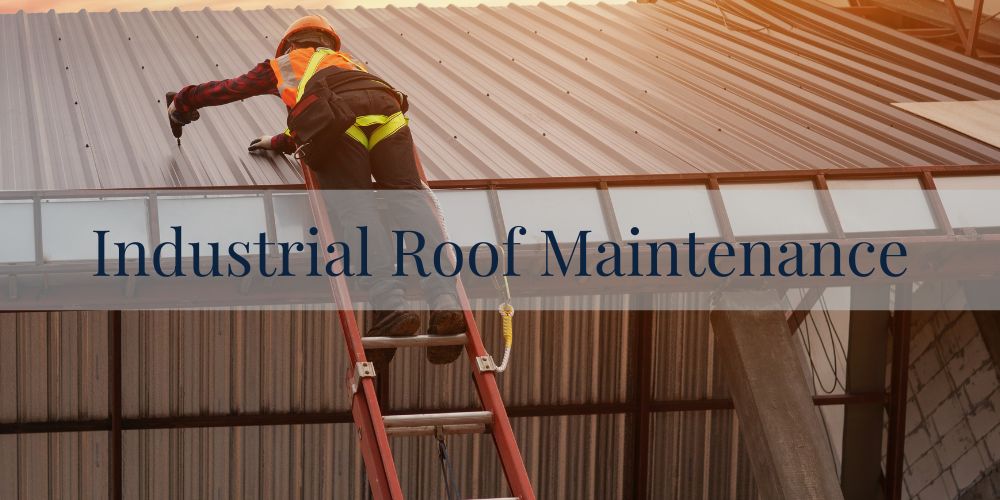Commercial Roofing New York provides industrial roof maintenance across New York to keep large facilities watertight, safe, and fully operational. Industrial roof maintenance is the routine inspection, cleaning, and repair of roofing systems designed to protect factories and warehouses in New York’s demanding environment. This service allows Commercial Roofing New York to prevent leaks, reduce downtime, and extend the life of industrial roofs. Commercial Roofing New York maintains roofs exposed to New York’s UV radiation, heavy rain, freeze thaw cycles, wind, and rooftop equipment traffic. These conditions create leaks, surface damage, and drainage problems when not properly managed. Commercial Roofing New York uses industrial maintenance programs to keep critical facilities protected, compliant, and running without interruption.
How Does Industrial Roof Maintenance Prevent Leaks and Operational Risk in New York’s Extreme Conditions?
New York’s industrial roofs are exposed to constant stress from heavy rainfall, snowmelt, UV radiation, and the mechanical impact of rooftop equipment and maintenance traffic. These forces open seams, fatigue membranes, and block drainage systems, allowing water to enter the roof assembly and threaten insulation, structural components, and sensitive interior operations. When moisture is allowed to accumulate, even small defects can shut down production and damage high-value equipment. We perform industrial roof maintenance to remove those risks before they escalate. By clearing drains, inspecting seams, and repairing surface damage, we prevent water from pooling and force moisture out of the system before it can migrate into the building. This keeps New York’s weather from turning routine wear into facility-wide failures. Commercial Roofing New York designs maintenance programs specifically for the realities of industrial facilities. We account for vibration, thermal movement, chemical exposure, and frequent rooftop access when selecting materials and scheduling service. That allows industrial roofs to remain watertight, structurally stable, and capable of protecting continuous operations through every season.
What Is Industrial Roof Maintenance and How Is It Used in New York?
Industrial roof maintenance is a scheduled program of inspections, cleaning, and minor repairs designed to preserve the performance of heavy-duty roofing systems. It focuses on preventing leaks, managing drainage, and maintaining the integrity of membranes, seams, and protective coatings. In New York, we use industrial maintenance programs to manage the effects of UV exposure, freeze-thaw cycling, heavy precipitation, and rooftop equipment traffic. By maintaining roof systems proactively, we extend their service life, reduce downtime, and keep critical industrial facilities protected and compliant year-round.
These maintenance actions create the following material-level performance outcomes:
- Drain and scupper cleaning → restores water flow → ponding does not force moisture into seams
- Routine seam and flashing resealing → preserves joint integrity → thermal movement does not open leak paths
- Protective coatings and surface repairs → shield membranes from UV and chemicals → materials do not become brittle or degraded
- Fastener and attachment checks → stabilize vibrating components → mechanical motion does not fatigue the roof system
- Scheduled condition tracking → identifies early deterioration → failures are corrected before production is impacted
Have a question about an upcoming project?
How Does Industrial Roof Maintenance Control Water, Debris, and Mechanical Wear on New York Facilities?
Industrial roofs in New York are not damaged by weather alone, they fail when water, debris, and mechanical stress are allowed to compound. Snowmelt and rain carry contaminants into drains, debris blocks flow paths, and vibration from rooftop equipment loosens seams and fasteners. Once water begins to sit on the roof, freeze-thaw cycles and chemical residues accelerate membrane breakdown and corrosion beneath the surface. We use maintenance to interrupt that chain before it reaches the building. We keep industrial roofs functioning by restoring how the system moves water and absorbs stress. Drainage channels are cleared so runoff leaves the roof instead of ponding against seams and flashings. Seams, coatings, and fasteners are inspected and resealed before vibration and thermal movement can turn small separations into leak paths. That prevents New York’s weather and equipment loads from forcing moisture into insulation and decking. Commercial Roofing New York also designs maintenance around the realities of active industrial sites. We track where foot traffic, exhaust discharge, and equipment vibration concentrate stress on the roof and reinforce those areas before fatigue creates structural or waterproofing failure. This keeps the roof assembly stable, watertight, and capable of protecting operations through every season.
- Drain and scupper cleaning → heavy rain and snowmelt → runoff exits the roof instead of pooling against seams.
- Seam and flashing resealing → freeze-thaw and vibration → joints remain closed as materials expand and contract.
- Surface patching and coating → UV exposure and chemical residue → membranes do not harden or break down.
- Fastener and attachment checks → rooftop equipment movement → panels and membranes do not loosen or lift.
- Targeted reinforcement zones → repeated foot traffic → wear stays localized instead of spreading through the system.
When Do New York Industrial Roofs Need Ongoing Professional Maintenance?
If your facility is experiencing ponding around equipment, seam movement, chemical residue on roof surfaces, or repeated minor leaks, New York’s industrial exposure may already be degrading the roof system. Vibration, freeze-thaw cycling, exhaust contaminants, and constant rooftop access slowly weaken membranes, fasteners, and drainage components, allowing moisture to migrate into insulation and structural decks. We evaluate how your industrial roof is responding to real operating conditions across weather, loading, and chemical exposure. If maintenance gaps are allowing deterioration to accelerate, we can identify where performance is slipping and implement the precise maintenance actions needed to keep your facility dry, compliant, and fully operational.

